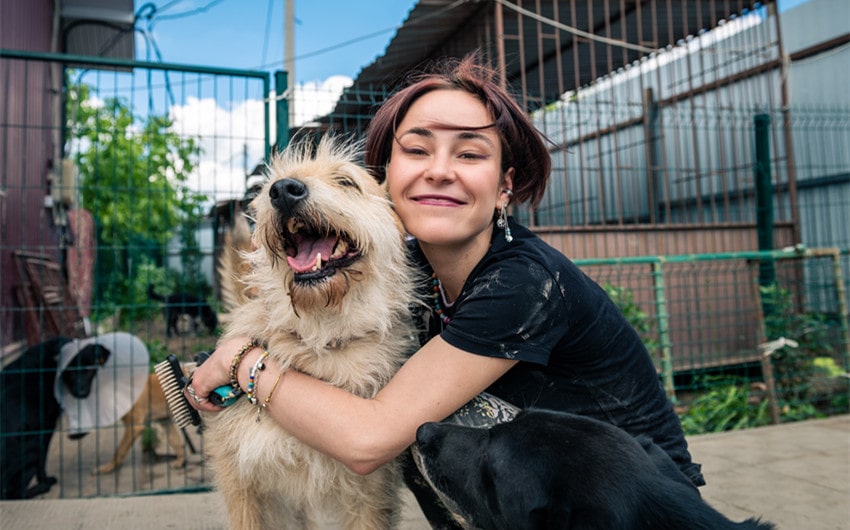Bringing Home an Older Rescue Pet: What to Expect & How to Prepare
Adopting an older rescue pet can be one of the most rewarding decisions you’ll ever make. While puppies and kittens often get the most attention, senior animals have just as much love to give, with the added benefit of being housetrained and calmer (in most cases). However, bringing a senior pet into your home has its own set of unique needs to help make the process as smooth as possible.
Let’s take a look at the various considerations of bringing an older pet into your life and how to prepare your home to ensure your pet’s golden years are filled with comfort and care.
Why Adopt a Senior Pet?
As per the RSPCA, the cost-of-living crisis has left many rescue centres facing an ‘animal welfare crisis’ as more animals come into their care than are adopted. Many people want to adopt puppies and kittens, which means older animals in animal shelters often get overlooked. However, senior cats and dogs have so many benefits, typically being more calm, well-mannered, and already being trained. This can make the transition into your home smoother and less chaotic than with a younger animal.
If you’re not able to or can’t commit to the frequent exercise that younger dogs need, a senior dog could be the perfect option. As they get older, senior dogs typically require fewer and shorter walks, which is ideal if you have limited mobility or less time to be able to go on regular walks. Many older dogs are already house-trained, lead-trained, and understand basic commands, which saves time and effort during the adjustment period.
Senior cats are usually litter-trained and already have established personalities, so it’s easier to choose a cat that suits your lifestyle and preferences. Unlike high-energy kittens, senior cats are more likely to enjoy lounging in a sunny spot, curling up beside you, or engaging in gentle play. They’re perfect for people who are looking for a quieter, low-maintenance pet.
Many senior animals end up in shelters through no fault of their own. Whether their previous owners had a change of circumstances or the owners find they’re no longer able to care for the animal, senior pets sadly end up in rescue centres, sometimes for many weeks, months or even years.
Understanding the Needs of Older Rescue Animals
Older rescue animals come with a lifetime of experiences, some good and some challenging, which affect how they behave and interact with people and other animals. Just like us, many animals develop health issues as they get older, such as arthritis, reduced vision or hearing and dental problems. They may need more trips to the vet, specific medication or a tailored diet to help them cope with their health issues. Older pets may also have limited mobility and struggle getting up and down the stairs, or even need specialist bedding.
Older pets in shelters have experienced the loss of their old owner and home, which can be traumatic for many animals. They may have developed anxiety and confusion, which could be expressed through fear or aggression. It often takes time and patience to settle an older pet into new routines and warm them up to their new home and owners. In some cases, older pets may be too set in their ways to learn new behaviours and could stay fearful or express aggressive tendencies, which is something to discuss before you adopt them.
Preparing Your Home for a Senior Pet
As with any pet that you’re introducing into your home, you need to create a safe and comfortable environment to help them settle in quickly. Senior pets may feel overwhelmed when entering a new environment, especially if they’ve spent time in a shelter. As per the Dogs Trust, you should set up a quiet area where they can retreat and relax without too much noise or foot traffic, such as in a spare room or office. This is where you should put their bed, which is where they can go to if for any reason they get overwhelmed or want to sleep. It’s important to communicate to everyone in the house that when your pet goes to their quiet space, they should be left alone and not disturbed.
It’s essential to put plenty of fresh water, bedding and litter boxes (for cats) in areas that your pet will spend a lot of time in. You may want to put rugs on hardwood or tiled floors to prevent your pet from slipping as they move around your home, especially if they have limited mobility. It’s also a good idea to remove any potential hazards, such as loose cables and toxic house plants, to avoid any accidents. If your senior pet has poor eyesight, you may want to use nightlights to help them when the main lights are off. And since older pets can sometimes wander or become disoriented, especially outdoors, using a GPS Collar can give you extra peace of mind by helping you track their location and keep them safe.
Building Trust & Bonding with Your New Companion
Giving a home to a senior pet is very rewarding, but it’s important to remember that trust takes time, especially if your new companion has had a difficult past. Every animal is different, so while one pet may settle into their new home within a few days, other animals can take weeks or months to relax fully. If your senior pet is also serving as an emotional support animal, patience is especially important—you need to give them space and time to explore their new surroundings and come to you when they’re ready.
Most pets do well with a routine, so stick to a consistent schedule for feeding, playtime, and quiet time. You should also speak gently and avoid sudden movements or loud noises, which can startle or confuse a senior animal. It’s also important to respect your pet’s boundaries and resist the urge to force interaction, instead letting them approach you when they feel ready. Remember, there’s no need to rush, so allow them time to warm to you and others in the home.
Play and exercise are key times when you can bond with your senior pet. Make sure to pick activities that match your pet’s energy level and physical ability, even if that’s just a short, gentle walk each day. Regular grooming, such as brushing and clipping claws, can also serve as a good time to bond with your pet, as long as you respect their boundaries. Consider scheduling time each day for grooming as part of your pet’s routine.
Health Checks & Visiting the Vet
Senior rescue pets often come with unknown or pre-existing health conditions, which makes regular veterinary care so important. You can get comprehensive pet insurance policies for many pre-existing medical conditions from insurers such as Petgevity, which can help you cover the cost of ongoing treatment for your senior pet. This peace of mind that you can help them whenever they need it will help make a stressful time more manageable.
It’s important to keep an eye on your pet’s weight, gums and teeth for any signs of change. Watch how they walk and move around for signs that they may be in pain, as this could indicate arthritis or other joint issues. Many older pets also develop manageable conditions such as kidney disease or diabetes, so talk with your vet if you suspect your pet is feeling under the weather or is acting unusually.
The Emotional Rewards of Adopting a Senior Pet
Adopting a senior pet can transform your life for the better. Older animals often develop strong relationships with their owners and can provide a calm presence in your home. Of course, it’s not always smooth sailing, and your pet may have behavioural or health issues, but with the proper care and attention, you can help them enjoy the golden years of their life. If you’ve not considered an older rescue pet before, hopefully, we’ve shown you there are plenty of good reasons to.







